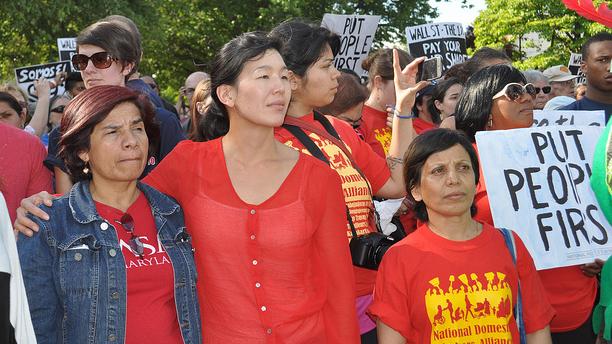Ai-jen Poo, Director of the National Domestic Workers Alliance, stands with National Peoples Action to demand accountability for the financial crisis on May 20, 2012, Washington, DC.
A lot of us depend on domestic workers. Think of the nannies, cleaners, and caretakers who allow many people to live their lives. Yet federal and state labor laws don't protect many of those workers. That's where Ai-jen Poo comes in.
She's the director of the National Domestic Workers Alliance. For nearly two decades, she's pushed to improve working conditions for those who toil in our homes. And this week, she found out that she's a winner of a MacArthur Fellowship — and a $625,000 check commonly known as the "genius grant."
"It was shocking and incredibly exciting and a little bit anxiety-producing," she says.
The anxiety comes from having a whole bunch of attention suddently focused on one of the most "visible invisible" communities in the nation. That phrase describes the very public work that many domestic workers do in places like playgrounds and schools and churches while still recieving little notice.
Poo's work involves going to these places and talking with women about organizing. The need for it, she says, is huge.
She relates the story of one woman who came to the US to help her child, who had a medical condition. The family needed expensive medication, and working in the US seemed like the only option. The woman ended up finding work as a caregiver to a child with a disability, but the job quickly expanded into cooking, cleaning, ironing and washing for the family of six.
The woman worked 14 to 16 hours a day, six days a week. The family paid her less than 3 dollars an hour, and her sleeping quarters were in a basement with an overflowing sewage system. After three years, the family called the woman in on her one day off, only to fire her. "She became homeless overnight," Poo says.
Poo says the woman told her story to a state legislator in New York. Along with the stories of other workers, it helped the state pass a domestic workers' Bill of Rights in 2010. It was a big victory for the workers' rights movement, but such situations is still common.
People often assume domestic workers are from foreign countries, and Poo says that’s true in many cities, like New York and Los Angeles. But in places like Atlanta, the workforce is African-American. In other places, the workers are white.
It’s a diverse population with one common trait: The workers take pride in what they do. All of them realize their work enables others to work as well. “They really do love taking care of other people,” she says. “And they do it with pride, and a seriousness and a patience that is really profound.”
Poo says that such dedication and belief never cease to amaze her. She thinks the relative success she's had in organizing domestic workers is due to the workers themselves understanding their importance.
She admits she has a long way to go. Domestic workers in the US are, by and large, still unprotected. Only four states have basic domestic worker protections. There may still be 46 states to go, but Poo says she has hope: “It builds off many generations of domestic workers organizing.”
Our coverage reaches millions each week, but only a small fraction of listeners contribute to sustain our program. We still need 224 more people to donate $100 or $10/monthly to unlock our $67,000 match. Will you help us get there today?
